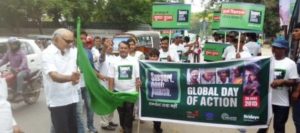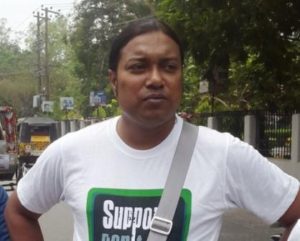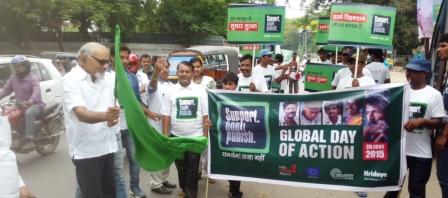What does a common cop do to ensure his police station has ‘contributed’ to International Day against Drug Abuse? How does he show that they are all very serious about the ‘War on Drugs’? The big drug cartels are too powerful and far away. The local drug peddler is a continuous source of ‘income’ for him and his senior officer. Some peddlers flaunt powerful political protection , so nabbing them would open up an uncomfortable can of worms. But the government wants to strut about on the world stage and has asked for results. So the cop and his buddies look into their records and round up all the drug users they can lay their hands on. Not the ones with connections, mind you, like films star and sons and daughters of Ministers, but the working classes, the ‘juggi-jhopdi wallahs’ etcetera, etcetera, etcetera!
It’s time to change the narrative, some folks in Bihar asserted on June 26, the International Day against Drug Abuse and Illicit Trafficking.
“A drug addict is the most misunderstood and maligned member of our society. And if that addict has HIV, he is perhaps the most wretched and marginalized of all, says Suthirtha Dutta, a self-identified former drug user turned activist with the Hridaya Project under India HIV/AIDS Alliance. Dutta , in tandem with NGOs Sister Nivedita Memorial Trust , Centre Direct and Bihar Drug users Forum and some 50 citizens campaigned with the slogan “Support. Don’t Punish”: reminding them that substance abuse has several ‘un-cool’ dimensions.

“June 26 is observed as the International Day Against Drug Abuse and Illicit trafficking. It’s ironic that this day, is used by governments to ‘celebrate’ drug arrests, seizures, and even executions. In India, as well as in other countries, the easiest way for police to obtain those impressive numbers that can showcase their success in the ‘war against drugs’, is to round up the poor drug users (not the powerful ones), and frame them for possession. In a way, June 26 is when you’re celebrating the trampling on the human rights of your weakest citizens,” Dutta explained.
Three NGOs working with injecting drug users in Patna joined thousands of others in over 150 cities around the world to ‘change the narrative and highlight the need for a better approach.’ According to the National Aids Control Organisation (NACO) 2013-14 Annual report, there are some 4,250 people who inject drugs (PWID) in Bihar. This data is based on Bihar State AIDS Control Society (BSACS) figures obtained through their NGO partners working on ‘targeted interventions’. Obviously, this is the tip of the proverbial iceberg.

In a memorandum submitted on the occasion to BSACS and the District Collector, the campaigners pointed out that the number of de-addiction and rehabilitation centres supported by the Health and Family Welfare Ministry and Social Justice department was inadequate. Even the existing services are faulty.
‘Violence, maltreatment, refusal of services, forcefully keeping clients for more days than required within the de-addiction programme’ were some of the unethical practices of privately run centres. The campaigners appealed to the government to ensure monitoring of all de-addiction services and their compliance with the minimum care standards laid down by the Health and Family Welfare Ministry.
“The issues are just so many, that we can’t discuss them in an hour or address them with one event. Has this ‘war on drugs’ approach achieved anything? You criminalize the users, throw them in jail, some countries execute them. Can we say that the number of drug users has gone down? Honestly, no. You have just pushed the users further underground, and made the illicit trade even more profitable for the drug cartels. And of course the local cop has a powerful stick with which to extract bribes and protection money, hence your war on drugs has furthered corruption,” argues Dutta.
“Our approach is, don’t criminalize the user in such a way that there is no hope for real rehabilitation. There are several instances of a recovering addict being framed by policemen and being thrown in jail, where his hope for a future is dashed. We are saying, families should be more understanding of youngsters who have fallen into this habit and support them to kick the habit. But the youngster is usually treated like a criminal within his own family as well, and that drives the person towards despair, destruction and more drug use. Governments should try the ‘harm reduction’ approach towards people injecting drugs.”
The ‘Global Day of Action’ is a show of public support for better drug policies. The activists plan to work with the government and civil society to ensure better services for people who inject drugs (PWID) with a special focus on those with HIV AIDS related problems.



Very interesting and informative article.
I saw a programme on the BBC last weekend and it was about the number of drug users in prison, often they are caught with very small amounts of drugs on them, mostly for personal use. The US government’s war on drugs is even worse than ours, and most of the young people in jail for drug related offences, are black Americans, sometimes incarcerated for 10-15 years or more. The prisons are overcrowded as a result, but now the government is looking into their own laws to try and change this. So maybe we can take a leaf out of their book.
Drug addiction is a habit, not a crime, as is alcoholism, so I cannot understand why these mostly young people are being rounded up by the police. Perhaps the cops should do the same for those who drink in bars, restaurants or on the street.
Detox and rehab are the answers to this problem and the stigma against drug users should be scrapped so that more people come forward for help. Young people should support their friends who are taking drugs by encouraging them to go for treatment. There should be family counselling so that parents and siblings are not anti drug users but any anti drugs only.
Warm regards
V.L.